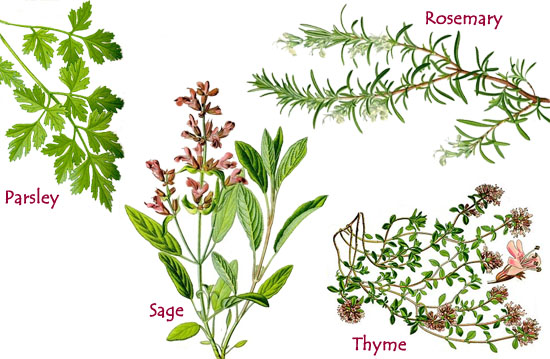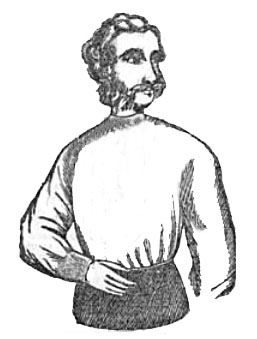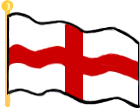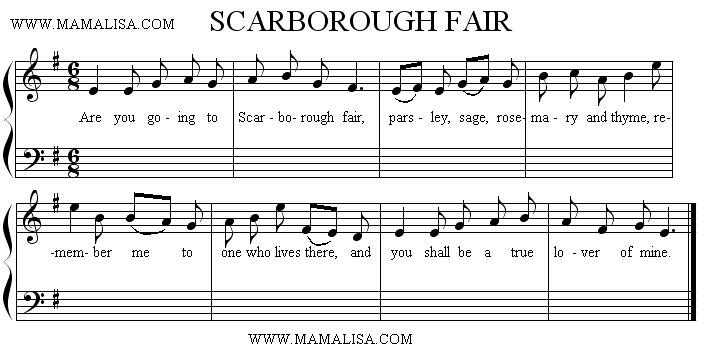Scarborough Fair
Most people know the song, "Parsley, Sage, Rosemary and Thyme" from the Simon & Garfunkel rendition of it on their album from 1966. The song originally comes from an English folk song.
According to Wikipedia, it dates back to the 17th century in a variation of the song called, "The Elfin Knight". There are many versions of this song. Below is a common version of the song as it's sung today. It's a dialogue between a man and woman... notice the tasks being asked are impossible to fulfill.

Scarborough Fair
Traditional Song
Are you going to Scarborough Fair?
Parsley, sage, rosemary and thyme,
Remember me to one who lives there
And you shall be a true lover of mine.
Can you make me a cambric shirt,
Parsley, sage, rosemary and thyme,
Without any seam or needle work?
And you shall be a true lover of mine.
Can you wash it in yonder well,
Parsley, sage, rosemary and thyme,
Where never sprung water, nor rain ever fell?
And you shall be a true lover of mine.
Can you dry it on yonder thorn,
Parsley, sage, rosemary and thyme,
Which never bore blossom since Adam was born?
And you shall be a true lover of mine.
Now you have ask'd me questions three,
Parsley, sage, rosemary and thyme,
I hope you'll answer as many for me,
And you shall be a true lover of mine.
Can you find me an acre of land,
Parsley, sage, rosemary and thyme,
Between the salt water and the sea sand?
And you shall be a true lover of mine.
Can you plow it with a ram's horn,
Parsley, sage, rosemary and thyme,
And sow it all over with one pepper corn?
And you shall be a true lover of mine.
Can you reap it with a sickle of leather,
Parsley, sage, rosemary and thyme,
And bind it up with a peacock's feather,
And you shall be a true lover of mine.
When you have done and finish'd your work,
Parsley, sage, rosemary and thyme,
Then come to me for your cambric shirt,
And you shall be a true lover of mine.
Notes
The first verse is not always sung as part of the song. When it is in the lyrics, the name of the Fair is sometimes different, as in the verse below:
Are you going to Whittingham Fair?
Parsley, sage, rosemary and thyme,
Remember me to one who lives there
And you shall be a true lover of mine.
An American version has the line as:
"O where are you bound, are you bound to Cape Ann?"
Or "Can't you show me the way to Cape Ann ?"
Here's another variation:
As I was a-walking up Strawberry Lane,
Every rose grows merry and fine,
I chanced for to meet a pretty, fair maid,
Who wanted to be a true-lover of mine.

Comments
Symbolism of Herbs
Parsley: According to Charles Dickens, parsley was a symbol of death. It came from the Greeks because it grew over their graves. Even in Dickens' time in England some considered parsley unlucky.
(Source: Charles Dickens' "All the Year Round", Volume 56, 1885.)
Sage: According to Dickens, people thought sage was wholesome. In particular, eating sage in May led to a long life.
(Source: Charles Dickens' "All the Year Round", Volume 56, 1885.)
Rosemary: "Rosemary... was 'grown for two ends' - marriage and death. It has long been considered as a symbol of remembrance, and, in ancient times, figured largely in the festivals and funerals of our forefathers, as it does even to this day in some country places of England. It was anciently supposed to strengthen the memory..."
(Source for Rosemary: The Country Gentleman, Volume 23 by L. Tucker, 1864.)
Thyme: "Thyme became proverbial as the symbol of sweetness. It was the highest compliment that the shepherd could pay to his mistress..."
(Source: The Garden: An Illustrated Weekly Journal of Gardening in All Its Branches, Volume 12 by William Robinson, 1877 - Quoting Virgil.)
Thyme: "This plant had the reputation of giving courage and strength through its smell..."
(Source: The Scottish Naturalist, Volume 6, 1882.)
*****
There's an interesting site about the song Scarborough Fair.


Thanks!
Thanks and Acknowledgements
The lyrics above (minus the first verse) can be found in "Gammer Gurton's Garland: or, The Nursery Parnassus" (1810) by Joseph Ritson.
1st image composed by Mama Lisa.
The illustration of the man in a cambric shirt comes from an ad for French Cambric shirts (sold by Sampson & Co. Shirt Tailors in London) circa the 1850's. The image was edited by Mama Lisa to have no seams!


























